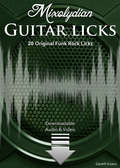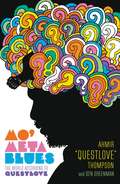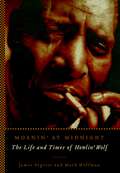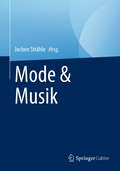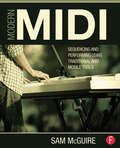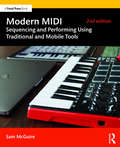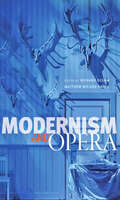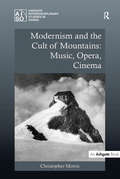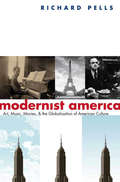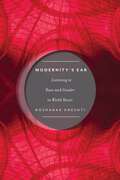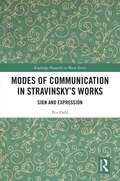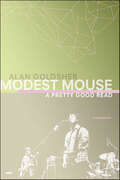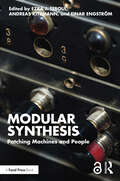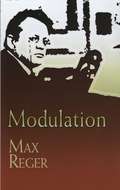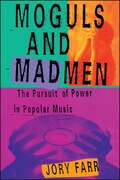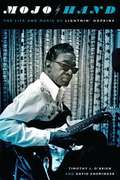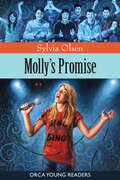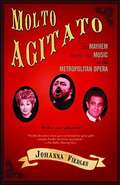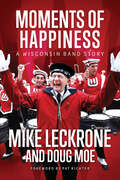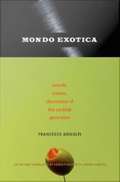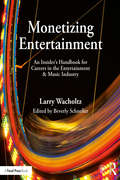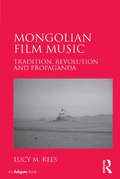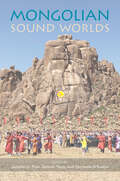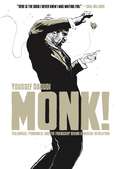- Table View
- List View
Mixolydian Guitar Licks: 20 Original Funk Rock Licks with Audio & Video (Modal Guitar Licks #5)
by Gareth Evans20 original Mixolydian guitar licks in tablature and notation for the progressing guitarist at intermediate to advanced level. >> 81 bars of music over 20 licks (average lick length 4.05 bars) >> Video at full speed & Audio at full & half speed (Downloadable) >> Backing tracks at full and slower practise speeds (Downloadable) >> Scale diagrams with theory and technique tips for each lick >> Guitar tablature includes picking directions & fretting finger guide numbers >> Mixolydian guitar licks over a static chord, over a I IV chord sequence and in swing time >> Techniques include: Alternate picking, String Bends, Tremolo bar, Sliding, Economy, Picking, Legato, Sweep picking, Vibrato, Hybrid Picking, Finger Rolls, Trills, and more. Please Note: This eBook has written music and is not suitable for smaller screens.
Mo' Meta Blues: The World According to Questlove
by Ben Greenman Ahmir Questlove" Thompson"You have to bear in mind that [Questlove] is one of the smartest motherfuckers on the planet. His musical knowledge, for all practical purposes, is limitless." --Robert ChristgauMO' META BLUESThe World According to QuestloveMo' Meta Blues is a punch-drunk memoir in which Everyone's Favorite Questlove tells his own story while tackling some of the lates, the greats, the fakes, the philosophers, the heavyweights, and the true originals of the music world. He digs deep into the album cuts of his life and unearths some pivotal moments in black art, hip hop, and pop culture. Ahmir "Questlove" Thompson is many things: virtuoso drummer, producer, arranger, Late Night with Jimmy Fallon bandleader, DJ, composer, and tireless Tweeter. He is one of our most ubiquitous cultural tastemakers, and in this, his first book, he reveals his own formative experiences--from growing up in 1970s West Philly as the son of a 1950s doo-wop singer, to finding his own way through the music world and ultimately co-founding and rising up with the Roots, a.k.a., the last hip hop band on Earth. Mo' Meta Blues also has some (many) random (or not) musings about the state of hip hop, the state of music criticism, the state of statements, as well as a plethora of run-ins with celebrities, idols, and fellow artists, from Stevie Wonder to KISS to D'Angelo to Jay-Z to Dave Chappelle to...you ever seen Prince roller-skate?!? But Mo' Meta Blues isn't just a memoir. It's a dialogue about the nature of memory and the idea of a post-modern black man saddled with some post-modern blues. It's a book that questions what a book like Mo' Meta Blues really is. It's the side wind of a one-of-a-kind mind. It's a rare gift that gives as well as takes. It's a record that keeps going around and around.
Moanin' at Midnight: The Life and Times of Howlin' Wolf
by James Segrest Mark Hoffman<P>Howlin' Wolf was a musical giant in every way. <P>He stood six foot three, weighed almost three hundred pounds, wore size sixteen shoes, and poured out his darkest sorrows onstage in a voice like a raging chainsaw. Half a century after his first hits, his sound still terrifies and inspires. <P>Born Chester Burnett in 1910, the Wolf survived a grim childhood and hardscrabble youth as a sharecropper in Mississippi. <P>He began his career playing and singing with the first Delta blues stars for two decades in perilous juke joints. <P>He was present at the birth of rock 'n' roll in Memphis, where Sam Phillips-who also discovered Elvis Presley, Johnny Cash, and Jerry Lee Lewis-called Wolf his "greatest discovery." <P>He helped develop the sound of electric blues and vied with rival Muddy Waters for the title of king of Chicago blues. He ended his career performing and recording with the world's most famous rock stars. <P>His passion for music kept him performing-despite devastating physical problems-right up to his death in 1976. <P>There's never been a comprehensive biography of the Wolf until now. Moanin' at Midnight is full of startling information about his mysterious early years, surprising and entertaining stories about his decades at the top, and never-before-seen photographs. It strips away all the myths to reveal-at long last-the real-life triumphs and tragedies of this blues titan.
Mode & Musik
by Jochen SträhleDieses Buch wird das Verständnis der Leser für die Verbindungen zwischen der Musik- und der Modeindustrie erweitern. Es hebt die Herausforderungen hervor, denen sich die Modeindustrie derzeit in Bezug auf den Hyperwettbewerb, die Definition immer schnellerer Trends, sich ändernde Verbraucherwünsche usw. gegenübersieht. Die Modeindustrie wird in der Tat stark von der digitalen Revolution in der Musikindustrie beeinflusst, die das Gesicht des individuellen Musikkonsums und des sozialen Bezugs verändert hat und sich daher auch auf den Modekonsum und den sozialen Bezug auswirkt. Dieses Verständnis ist von entscheidender Bedeutung, um die Strategien eines Modeunternehmens auf die Anforderungen der modernen Modekonsumenten auszurichten. Inhaltlich befasst sich das Buch zunächst mit der sozialen Perspektive von Mode und Musik. Dazu gehört eine Analyse der Musik als wichtiger Einflussfaktor für Modetrends, sowohl theoretisch als auch anhand einer Fallstudie über Grunge-Musik. Anschließend wird die Rolle der Musik in der Modebranche behandelt, wobei die Musik in den Geschäften und die Rolle der Musik in der Modekommunikation behandelt werden. Im Anschluss daran wird die Rolle der Mode im Musikgeschäft analysiert. Dazu gehören der Trend zum Co-Design von Modekollektionen, die Rolle von Musikkünstlern bei der Differenzierung nach Stilrichtungen und der Markt für Musik-Mode-Merchandise-Artikel (sowohl theoretisch als auch anhand einer Fallstudie). Abschließend werden mögliche Lehren aus der Musikindustrie für die Modeindustrie gezogen. Dazu gehört auch eine Analyse der digitalen Revolution und des Aufkommens der Crowdfunding-Idee (sowohl theoretisch als auch in einer Fallstudie).
Modern Band Method - Guitar: A Beginner's Guide for Group or Private Instruction
by Scott Burstein Spencer Hale Mary Claxton Dave WishWinner of the 2021 "Best Tools for Schools" award for best method! The Modern Band Method series provides a guided lesson plan for the absolute beginner, complete with audio tracks, video lessons, and many popular songs by the biggest artists of the day! This guitar method works in tandem with the other instrument methods in the series, allowing students to play the same songs together as a full band! <p><p>Guitar lessons include: * Tuning * Reading music and tablature * Chords and strum patterns * Single notes and scales * Basic soloing * Hammer-ons, pull-offs and slides * Alternate picking * Bending * Syncopation * Composing a song * Writing lyrics Songs include: Can't Stop the Feeling! * Closer * Come As You Are * I Gotta Feeling * Imagine * Misirlou * Seven Nation Army * Smells like Teen Spirit * Sunshine of Your Love * 25 or 6 to 4 * U Can't Touch This * Umbrella * Uptown Funk * Waka Waka (This Time for Africa) * Zombie * and more.
Modern MIDI: Sequencing and Performing Using Traditional and Mobile Tools
by Sam McGuireIn the last five years, the environment in which the Musical Instrument Digital Interface (MIDI) specification works and the tools that communicate via MIDI have changed dramatically. Modern MIDI: Sequencing and Performing Using Traditional and Mobile Tools gives you all the tools you need to properly and effectively use MIDI in a modern setting, while still incorporating vintage MIDI gear. Exploring typical workflows and techniques for both the studio and the performing environment, this book helps you navigate the changes that mobile computing has made to the way the music producers and engineers work with MIDI. If you’re a MIDI user seeking to increase your efficiency and productivity while still gaining an understanding of the fundamentals of MIDI, or a music professional looking to incorporate your mobile devices into your creative process, this is the book for you. Modern MIDI shows you how to implement the necessary components to use MIDI on your iPad, Android phone, or laptop.
Modern MIDI: Sequencing and Performing Using Traditional and Mobile Tools
by Sam McGuireModern MIDI equips you with everything you need to use MIDI in your music productions. With a particular focus on practical application and step-by-step explanations, this book does far more than tell you about how MIDI works. Simple explanations and real-world scenarios encourage you to test out the techniques for yourself. The second edition of Modern MIDI builds on the first, making sequencing approachable for absolute beginners, reinforcing the fundamentals of MIDI and expanding the coverage into new mobile technology and vintage gear. Modern MIDI is essential reading for beginners from all backgrounds, including students and professionals, as well as experienced users looking to develop their existing setups.
Modernism and Opera (Hopkins Studies in Modernism)
by Richard Begam and Matthew Wilson SmithMany of the greatest works in the operatic repertoire bear the hallmarks of modernism.At first glance, modernism and opera may seem like strange bedfellows—the former hostile to sentiment, the latter wearing its heart on its sleeve. And yet these apparent opposites attract: many operas are aesthetically avant-garde, politically subversive, and socially transgressive. From the proto-modernist strains of Richard Wagner’s Parsifal through the twenty-first-century modernism of Kaija Saariaho’s L’amour de loin, the duet between modernism and opera, at turns harmonious and dissonant, has been one of the central artistic events of modernity. Despite this centrality, scholars of modernist literature only rarely venture into opera, and music scholars generally return the favor by leaving literature to one side. But opera, that grand cauldron of the arts, demands that scholars, too, share the stage with one another.In Modernism and Opera, Richard Begam and Matthew Wilson Smith bring together musicologists, literary critics, and theater scholars for the first time in a mutual endeavor to trace certain key moments in the history of modernism and opera. This innovative volume includes essays from some of the most notable scholars in their fields and covers works as diverse as Debussy’s Pelléas et Mélisande, Bartók’s Bluebeard’s Castle, Berg’s Wozzeck, Janáček’s Makropulos Case, Thomson’s Four Saints in Three Acts, Strauss’s Arabella, Schoenberg’s Moses und Aron, Stravinsky’s The Rake’s Progress, Britten’s Gloriana, and Messiaen’s Saint François d’Assise. A collaborative study of the ultimate collaborative art form, Modernism and Opera reveals how modernism and opera illuminate each other and, more generally, the culture of the twentieth century. It also addresses a number of issues crucial for understanding the relation between modernism and opera, focusing in particular on intermediality (how modernism integrates music, literature, and drama into opera) and anti-theatricality (how opera responds to modernism’s apparent antipathy to theatricality). This captivating book—the first of its kind—will appeal to scholars of literature, music, theater, and modernity as well as to sophisticated opera lovers everywhere.
Modernism and the Cult of Mountains: Music, Opera, Cinema (Ashgate Interdisciplinary Studies in Opera)
by Christopher MorrisAdopting and transforming the Romantic fascination with mountains, modernism in the German-speaking lands claimed the Alps as a space both of resistance and of escape. This new 'cult of mountains' reacted to the symptoms and alienating forces associated with modern culture, defining and reinforcing models of subjectivity based on renewed wholeness and an aggressive attitude to physical and mental health. The arts were critical to this project, none more so than music, which occupied a similar space in Austro-German culture: autonomous, pure, sublime. In Modernism and the Cult of Mountains opera serves as a nexus, shedding light on the circulation of contesting ideas about politics, nature, technology and aesthetics. Morris investigates operatic representations of the high mountains in German modernism, showing how the liminal quality of the landscape forms the backdrop for opera's reflexive engagement with the identity and limits of its constituent media, not least music. This operatic reflexivity, in which the very question of music's identity is repeatedly restaged, invites consideration of musical encounters with mountains in other genres, and Morris shows how these issues resonate in Strauss's Alpine Symphony and in the Bergfilm (mountain film). By using music and the ideology of mountains to illuminate aspects of each other, Morris makes an original and valuable contribution to the critical study of modernism.
Modernist America: Art, Music, Movies, and the Globalization of American Culture
by Richard PellsAmerica's global cultural impact is largely seen as one-sided, with critics claiming that it has undermined other countries' languages and traditions. But contrary to popular belief, the cultural relationship between the United States and the world has been reciprocal, says Richard Pells. The United States not only plays a large role in shaping international entertainment and tastes, it is also a consumer of foreign intellectual and artistic influences. Pells reveals how the American artists, novelists, composers, jazz musicians, and filmmakers who were part of the Modernist movement were greatly influenced by outside ideas and techniques. People across the globe found familiarities in American entertainment, resulting in a universal culture that has dominated the twentieth and twenty-first centuries and fulfilled the aim of the Modernist movement--to make the modern world seem more intelligible. Modernist America brilliantly explains why George Gershwin's music, Cole Porter's lyrics, Jackson Pollock's paintings, Bob Fosse's choreography, Marlon Brando's acting, and Orson Welles's storytelling were so influential, and why these and other artists and entertainers simultaneously represent both an American and a modern global culture.
Modernity's Ear: Listening to Race and Gender in World Music (Postmillennial Pop #3)
by Roshanak KheshtiInside the global music industry and the racialized and gendered assumptions we make about what we hear Fearing the rapid disappearance of indigenous cultures, twentieth-century American ethnographers turned to the phonograph to salvage native languages and musical practices. Prominent among these early “songcatchers” were white women of comfortable class standing, similar to the female consumers targeted by the music industry as the gramophone became increasingly present in bourgeois homes. Through these simultaneous movements, listening became constructed as a feminized practice, one that craved exotic sounds and mythologized the ‘other’ that made them.In Modernity’s Ear, Roshanak Kheshti examines the ways in which racialized and gendered sounds became fetishized and, in turn, capitalized on by an emergent American world music industry through the promotion of an economy of desire. Taking a mixed-methods approach that draws on anthropology and sound studies, Kheshti locates sound as both representative and constitutive of culture and power. Through analyses of film, photography, recordings, and radio, as well as ethnographic fieldwork at a San Francisco-based world music company, Kheshti politicizes the feminine in the contemporary world music industry. Deploying critical theory to read the fantasy of the feminized listener and feminized organ of the ear, Modernity’s Ear ultimately explores the importance of pleasure in constituting the listening self.
Modes of Communication in Stravinsky’s Works: Sign and Expression (Routledge Research in Music)
by Per DahlIgor Stravinsky left behind a complex heritage of music and ideas. There are many examples of discrepancies between his literate statements about music and musicians and his musical compositions and activity. Per Dahl presents a model of communication that unveils a clear and logical understanding of Stravinsky's heritage, based on the extant material available. From this, Dahl argues the case for Stravinsky’s music and his ideas as separate entities, representing different modes of communication. As well as describing a triangular model of communication, based on a tilted and extended version of Ogden's triangle, Dahl presents an empirical investigation of Stravinsky's vocabulary of signs and expressions in his published scores - his communicative mode towards musicians. In addition to simple statistics, Dahl compares the notation practice in the composer’s different stylistic epochs as well as his writing for different sizes of ensembles. Dahl also considers Stravinsky’s performances and recordings as modes of communication to investigate whether the multi-layered model can soften the discrepancies between Stravinsky the literate and Stravinsky the musician.
Modest Mouse: A Pretty Good Read
by Alan GoldsherTHE BEST WAY TO BECOME A ROCK STAR IS SOMETIMES THE WORST WAY TO BECOME A ROCK STARUnruly and antagonistic, the Washington State rock trio Modest Mouse would seem like one of the least likely candidates for mainstream stardom: Their often brilliant live performances sometimes collapsed into utter chaos. Their highly original, highly off-center songs ran as long as eleven minutes. And their leader managed to raise eyebrows among music writers, law officials . . . and sometimes even his fans.But Modest Mouse persevered. They didn't compromise their original, compelling musical style, nor did they lighten up on the attitude. They just waited for the world at large to catch up.In 2004, with the release of their smash single "Float On," it finally happened. And it was worth the wait. For everybody.Journalist Alan Goldsher uncovers the strange, little-known details of Modest Mouse's rise from DIY indie heroes to platinum-selling, Grammy-nominated international superstars. Goldsher also reveals the troubled background and fractured history of frontman Isaac Brock, a charismatic, cantankerous singer/songwriter who has spent as much time avoiding the media as he has attempting to control it.Thoroughly researched, sharply funny, and filled with more than thirty rare photos, this unauthorized biography shows how Modest Mouse trashed the Behind the Music mold and created their own unique version of the rock 'n' roll, rags-to-expensive-rags success story.
Modular Synthesis: Patching Machines and People
by Andreas Kitzmann Ezra J. Teboul Einar EngströmModular Synthesis: Patching Machines and People brings together scholars, artists, composers, and musical instrument designers in an exploration of modular synthesis, an unusually multifaceted musical instrument that opens up many avenues for exploration and insight, particularly with respect to technological use, practice, and resistance.Through historical, technical, social, aesthetic, and other perspectives, this volume offers a collective reflection on the powerful connections between technology, creativity, culture, and personal agency. Ultimately, this collection is about creativity in a technoscientific world and speaks to issues fundamental to our everyday lives and experiences, by providing insights into the complex relationships between content creators, the technologies they use, and the individuals and communities who design and engage with them.With chapters covering VCV Rack, modular synthesis, instrument design, and the histories of synthesizer technology, as well as interviews with Dave Rossum, Corry Banks, Meng Qi, and Dani Dobkin, among others, Modular Synthesis is recommended reading for advanced undergraduates, researchers, and practitioners of electronic music and music technology. Chapter 3 of this book is freely available as a downloadable Open Access PDF at http://www.taylorfrancis.com under a Creative Commons Attribution-Non Commercial-No Derivatives (CC-BY-NC-ND) 4.0 license.
Modulation: Music Book Index
by Max RegerIn addition to his international renown as a teacher, conductor, and pianist, Reger wrote more than 1,000 works in virtually every musical genre. Many scholars and musicians credit him with emancipating dissonance to a level that assisted Schoenberg's development of serialism in the 1920s. Reger's influence extends to other 20th-century composers, including Béla Bártok, Alban Berg, Arthur Honegger, Paul Hindemith, and Sergei Prokofiev.Modulation — the change from one key to another — is a subject of critical importance to performers and composers in their study of harmony. Reger wrote this concise guide to modulation while teaching composition at Leipzig Conservatory, and the work continues to provide valuable insights and instruction for musicians at all levels. This new edition features newly engraved musical examples.
Moguls And Madmen: The Pursuit of Power in Popular Music
by Jory FarrFrom Simon & Schuster, Moguls and Madmen is Jory Farr's guide to the pursuit of power in popular music. As Jory Farr describes in the prologue of Moguls and Madmen, "this book is not for them [multi millionaire super scouts and corporate executives], however. It's for all the musicians—and the musicians to come—who want to know what they're up against."
Mojo Hand: The Life and Music of Lightnin' Hopkins
by Timothy J. O'Brien David EnsmingerIn a career that took him from the cotton fields of East Texas to the concert stage at Carnegie Hall and beyond, Lightnin’ Hopkins became one of America’s greatest bluesmen, renowned for songs whose topics effortlessly ranged from his African American roots to space exploration, the Vietnam War, and lesbianism, performed in a unique, eccentric, and spontaneous style of guitar playing that inspired a whole generation of rock guitarists. Hopkins’s music directly and indirectly influenced an amazing range of artists, including Jimi Hendrix, Stevie Ray Vaughan, Miles Davis, John Coltrane, Tom Waits, and Bob Dylan, as well as bands such as the Grateful Dead, Jefferson Airplane, and ZZ Top, with whom Hopkins performed. Mojo Hand follows Lightin’ Hopkins’s life and music from the acoustic country blues that he began performing in childhood, through the rise of 1950s rock ’n’ roll, which nearly derailed his career, to his reinvention and international success as a pioneer of electric folk blues from the 1960s to the 1980s. The authors draw on 130 vivid oral histories, as well as extensive archival and secondary sources, to provide the fullest account available of the development of Hopkins’s music; his idiosyncratic business practices, such as shunning professional bookers, managers, and publicists; and his durable and indelible influence on modern roots, blues, rock ’n’ roll, singer-songwriter, and folk music. Mojo Hand celebrates the spirit and style, intelligence and wit, and confounding musical mystique of a bluesman who shaped modern American music like no one else.
Molly's Promise (Orca Young Readers)
by Sylvia OlsenWhen Molly learns a talent competition is coming to town, her friend Murphy (A Different Game, Murphy and Mousetrap) becomes her manager. Molly is certain she is a good singer—she has been singing in her head for as long as she can remember. She doesn't sing out loud because of a promise she made to herself. Years ago, Molly vowed that her mom would be the first one to hear her sing. The only problem is, Molly knows nothing about her mom, who left when Molly was a baby. With the talent competition only weeks away, she has to decide whether to break her promise to herself and let her voice out into the world, or wait for her mother's uncertain return before singing for anyone else.
Molto Agitato: The Mayhem Behind the Music at the Metropolitan Opera
by Johanna FiedlerIf the opera world is full of “intrigue, double meanings, and devious dramatics,” then no place exemplifies this more than the world-famous Metropolitan Opera, where politics, ambition, and oversized egos have traditionally taken center stage along with some of the world’s richest music. Drawing on her fifteen years as its press representative, Johanna Fiedler explodes the traditional secrecy that surrounds the Met in this wonderfully entertaining account of its tumuluous history.Fiedler chronicles the Met’s early days as a home for legends like Toscanini, Mahler, and Caruso, and gives a fascinating account of the middle years when haughty blue-bloods battled stubborn adminstrators for control of a company that would emerge as America’s premiere opera house. She takes us behind the grand gold-curtain stage in more recent years as well, showing how musical superstars like Luciano Pavarotti, Plácido Domingo, and Kathleen Battle have electrified performances and scandalized the public. But most revelatory are Fiedler’s portrayals of James Levine and Joseph Volpe and their practically parallel ascendancies—Levine rising from prodigy to artistic director, Volpe advancing from stagehand to general manager—and their once strained relationship. Weaving together the personal, economic, and artistic struggles that characterize the Met’s long and vibrant history, Molto Agitato is a must-read saga of power, wealth, and, above all, great music.
Moments of Happiness: A Wisconsin Band Story
by Doug Moe Mike LeckroneWhen Mike Leckrone retired as director of bands at the University of Wisconsin in 2019, he had served in that role for an astonishing fifty years. A brilliant showman, he became known for aerial stunts and sequined outfits. He created the Fifth Quarter celebration that follows all home football games, removed barriers for women to march in the band, and established regular appearances at Camp Randall by special-needs high school musicians. Above all, Leckrone always sought joy in life—which, along with his sixty-year love affair with his late wife, UW “band mom” Phyllis Leckrone, was perhaps the secret to his remarkable career. A consummate musician, as both a trumpeter and an arranger, Leckrone is also an outstanding raconteur—a talent beautifully on display in his long-awaited memoir. This book is the next best thing to sitting down with this master storyteller. Coauthor Doug Moe captures the joys of performing—whether at Camp Randall, in the Kohl Center, or along the Rose Bowl Parade route. Reading Leckrone’s story, one comes to understand the mix of discipline, showmanship, work ethic, warmth, toughness, wit, and musical skill that make him a Wisconsin treasure. Even for people who know Leckrone, Moments of Happiness details the stories behind the highlights and the unglamorous work that made his accomplishments possible. It both cements his legend and offers unprecedented insights into a career that will never be equaled.
Mondo Exotica: Sounds, Visions, Obsessions of the Cocktail Generation
by Francesco AdinolfiTiki torches, cocktails, la dolce vita, and the music that popularized them--Mondo Exotica offers a behind-the-scenes look at the sounds and obsessions of the Space Age and Cold War period as well as the renewed interest in them evident in contemporary music and design. The music journalist and radio host Francesco Adinolfi provides extraordinary detail about artists, songs, albums, and soundtracks, while also presenting an incisive analysis of the ethnic and cultural stereotypes embodied in exotica and related genres. In this encyclopedic account of films, books, TV programs, mixed drinks, and above all music, he balances a respect for exotica's artistic innovations with a critical assessment of what its popularity says about postwar society in the United States and Europe, and what its revival implies today. Adinolfi interviewed a number of exotica greats, and Mondo Exotica incorporates material from his interviews with Martin Denny, Esquivel, the Italian film composers Piero Piccioni and Piero Umiliani, and others. It begins with an extended look at the postwar popularity of exotica in the United States. Adinolfi describes how American bachelors and suburbanites embraced the Polynesian god Tiki as a symbol of escape and sexual liberation; how Les Baxter's album Ritual of the Savage (1951) ushered in the exotica music craze; and how Martin Denny's Exotica built on that craze, hitting number one in 1957. Adinolfi chronicles the popularity of performers from Yma Sumac, "the Peruvian Nightingale," to Esquivel, who was described by Variety as "the Mexican Duke Ellington," to the chanteuses Eartha Kitt, Julie London, and Ann-Margret. He explores exotica's many sub-genres, including mood music, crime jazz, and spy music. Turning to Italy, he reconstructs the postwar years of la dolce vita, explaining how budget spy films, spaghetti westerns, soft-core porn movies, and other genres demonstrated an attraction to the foreign. Mondo Exotica includes a discography of albums, compilations, and remixes.
Monetizing Entertainment: An Insider's Handbook for Careers in the Entertainment and Music Industry
by Larry Wacholtz<p><i>Monetizing Entertainment: An Insider's Handbook for Careers in the Entertainment and Music Industry</i> offers a thorough, guided exploration of the current state of the industry, with an emphasis on trends in copyright, digital streaming, and practical advice for developing a career as an artist, technician, or industry executive. <p>This book investigates a variety of topics within the entertainment and music industry, ranging from traditional and emerging business models to intellectual property rights to the creative destruction happening currently. The book strategically outlines the existing gaps that make being successful as an artist a dynamic interaction between creativity and business. <p>This book includes the following: <p> <li>An overview of the creative destruction process that has destroyed some of the old business models and created a number of career options. <li>A look at innovative, entrepreneurial career options. <li>A step-by-step examination for both creative and business professionals of the administrative and financial structures of the industry. <li>Detailed analysis of trends and topics shaping the current entertainment and music industry drawn from insiders' perspectives and other contemporary resources.</li> <p> <p>An accompanying website (www.routledge.com/cw/wacholtz), hosting case studies, videos, data, infographics, and blog posts on business models, is the perfect companion to this authoritative resource.</p>
Mongolian Film Music: Tradition, Revolution and Propaganda
by Lucy M. ReesIn 1936 the Mongolian socialist government decreed the establishment of a film industry with the principal aim of disseminating propaganda to the largely nomadic population. The government sent promising young rural Mongolian musicians to Soviet conservatoires to be trained formally as composers. On their return they utilised their traditional Mongolian musical backgrounds and the musical skills learned during their studies to compose scores to the 167 propaganda films produced by the state film studio between 1938 and 1990. Lucy M. Rees provides an overview of the rich mosaic of music genres that appeared in these film soundtracks, including symphonic music influenced by Western art music, modified forms of Mongolian traditional music, and a new genre known as ’professional music’ that combined both symphonic and Mongolian traditional characteristics. Case studies of key composers and film scores are presented, demonstrating the influence of cultural policy on film music and showing how film scores complemented the ideological message of the films. There are discussions of films that celebrate the 1921 Revolution that led to Mongolia becoming a socialist nation, those that foreshadowed the 1990 Democratic Revolution that drew the socialist era to a close, and the diverse range of films and scores produced after 1990 in the aftermath of the socialist regime.
Mongolian Sound Worlds
by Jennifer C. Post Bayarsaikhan Badamsuren Otgonbayar Chuluunbaatar Andrew Colwell Johanni Curtet Tserendava Dashdorj Charlotte D'Evelyn Tamir Hargana Peter K Marsh K Oktyabr Rebekah Plueckhahn Sunmin YoonMusic cultures today in rural and urban Mongolia and Inner Mongolia emerge from centuries-old pastoralist practices that were reshaped by political movements in the twentieth century. Mongolian Sound Worlds investigates the unique sonic elements, fluid genres, social and spatial performativity, and sounding objects behind new forms of Mongolian music--forms that reflect the nation’s past while looking towards its globalized future. Drawing on fieldwork in locations across the Inner Asian region, the contributors report on Mongolia’s genres and musical landscapes; instruments like the morin khuur, tovshuur, and Kazakh dombyra; combined fusion band culture; and urban popular music. Their broad range of concerns include nomadic herders’ music and instrument building, ethnic boundaries, heritage-making, ideological influences, nationalism, and global circulation. A merger of expert scholarship and eyewitness experience, Mongolian Sound Worlds illuminates a diverse and ever-changing musical culture. Contributors: Bayarsaikhan Badamsuren, Otgonbaayar Chuulunbaatar, Andrew Colwell, Johanni Curtet, Charlotte D’Evelyn, Tamir Hargana, Peter K. Marsh, K. Oktyabr, Rebekah Plueckhahn, Jennifer C. Post, D. Tserendavaa, and Sunmin Yoon
Monk!: Thelonious, Pannonica, and the Friendship Behind a Musical Revolution
by Youssef Daoudi"Read this invigorating graphic narrative, then—quickly, before the spell breaks!—play one of Monk's records." —Saul Williams She is Kathleen Annie Pannonica de Koenigswarter, a free-spirited baroness of the Rothschild family. He is Thelonious Sphere Monk, a musical genius fighting against the whims of his troubled mind. Their enduring friendship begins in 1954 and ends only with Monk’s death in 1982.Set against the backdrop of New York during the heyday of jazz, Monk! explores the rare alchemy between two brilliant beings separated by an ocean of social status, race, and culture, but united by an infinite love of music. This breathtaking graphic novel by Youssef Daoudi beautifully captures the life of the “the high priest of bop” in spontaneous, evocative pen and ink that seems to make visible jazz itself.
